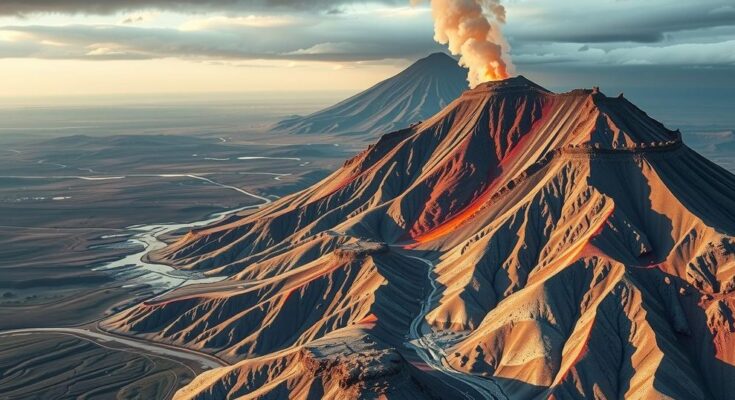On January 4, 2025, a magnitude-5.8 earthquake struck Ethiopia, near Addis Ababa, alongside an eruption of Mount Dofan Volcano. Authorities have ordered evacuations, citing increased seismic and volcanic risks. Egyptian geologist Abbas Sheraqi warns that this activity may impact the Grand Ethiopian Renaissance Dam and surrounding populations, amid ongoing disputes with Egypt and Sudan over water rights.
On January 4, 2025, a magnitude-5.8 earthquake occurred in Ethiopia, particularly affecting areas near Abomsa and Amhara, close to the capital, Addis Ababa. The earthquake struck at a depth of 10 kilometers, as reported by both the Ethiopian Geological Institute and the United States Geological Survey (USGS). The tremors have raised concerns among researchers, some of whom anticipate that the seismic activity may escalate further.
In conjunction with this seismic event, Mount Dofan Volcano in the Afar region has begun erupting, leading to large fissures appearing in the ground. Due to these developments, Ethiopian authorities have issued evacuation orders for thousands of residents, urging them to seek shelter in safe locations. Egyptian geologist Abbas Sheraqi remarked on social media that the current seismic activity in Ethiopia could signal more intensified quakes and volcanic eruptions, potentially affecting neighboring volcanoes like Fentale, located in populated regions.
Sheraqi expressed particular concern regarding the Grand Ethiopian Renaissance Dam (GERD), emphasizing that while Ethiopians residing near the dam are not in immediate danger, there are implications for neighboring Sudan. He stressed the importance of safeguarding the interests of all three countries involved in the GERD dispute: Egypt, Sudan, and Ethiopia. Negotiations concerning the dam have been ongoing for over a decade, with Cairo and Khartoum seeking a binding agreement to ensure the protection of their water rights. However, these discussions have stalled due to Ethiopia’s reluctance to agree to proposed solutions.
The combination of earthquake activity and volcanic eruptions in Ethiopia underscores a critical situation that warrants heightened attention from both local authorities and international observers. With potential risks not only to immediate communities but also to larger geopolitical tensions surrounding the Renaissance Dam, the situation remains volatile and deserves careful monitoring.
This article discusses the recent natural disasters affecting Ethiopia, specifically a significant earthquake and volcanic eruption. Earthquakes are common in the East African Rift region due to tectonic activity, and the country’s geological instability has been a subject of scientific interest. The Grand Ethiopian Renaissance Dam, a controversial infrastructure project, has been at the center of disputes involving Egypt and Sudan regarding water rights and management. The ongoing seismic activity is raising alarms and prompting officials to respond to the needs of affected communities.
In summary, the magnitude-5.8 earthquake in Ethiopia and the eruption of Mount Dofan Volcano represent significant geological events with the potential to impact thousands of residents. The ongoing threat of increased seismic activity necessitates immediate evacuation measures and underscores the broader geopolitical concerns related to the GERD and the relationships among Ethiopia, Egypt, and Sudan. Continuous monitoring and international dialogue will be essential in addressing both humanitarian and geopolitical facets of this crisis.
Original Source: www.egypttoday.com




